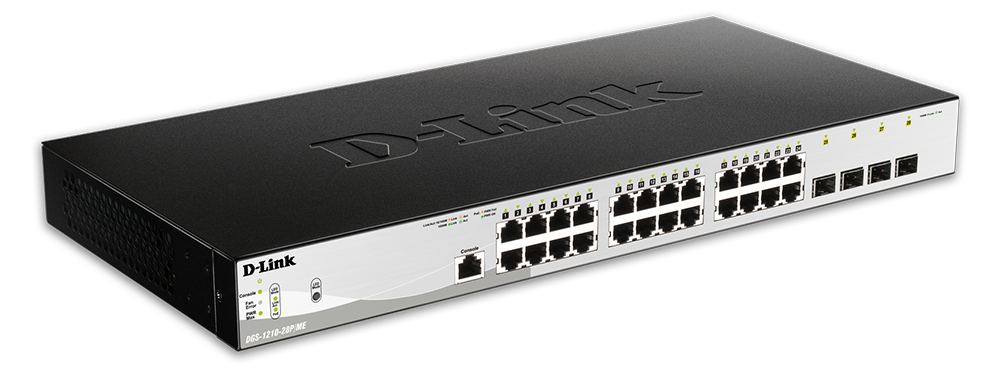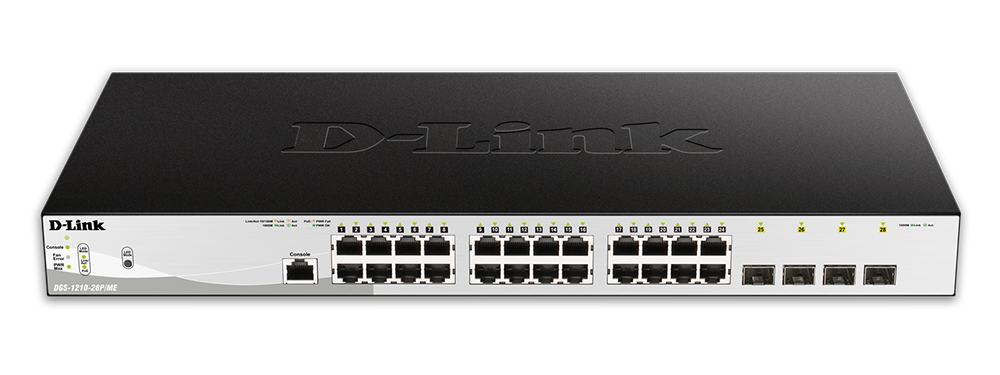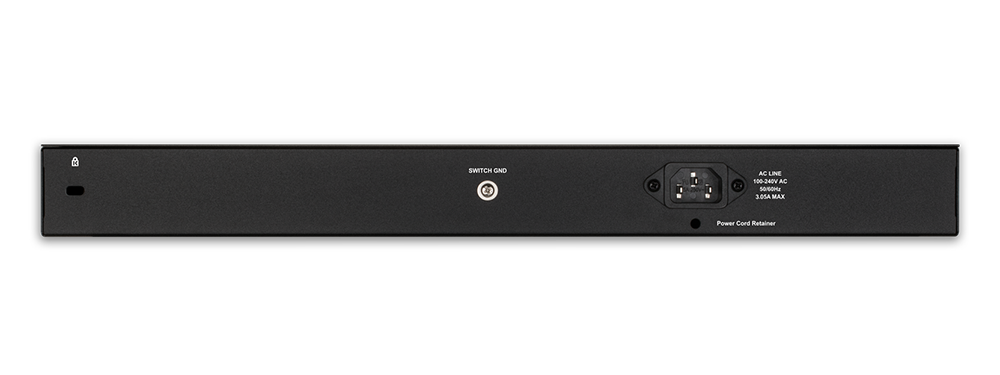
D-Link DGS-1210-28P/ME
24-Port Metro Ethernet Gigabit PoE Switch with 4 Gigabit SFP ports
Sorry, this product is no longer available, please contact us for a replacement.
Click here to jump to more pricing!
Overview:

The DGS-1210/ME Series Metro Ethernet Switches are a family of switches designed for Metro Ethernet applications. They feature a variety of port configurations, including 10/100/1000BASE-T RJ-45 ports, with and without PoE support, and 1G SFP optical ports. They can be managed with a Command Line Interface (CLI) or user-friendly web-based Graphical User Interface (GUI). Surge protection, advanced Layer 2 functions, and a suite of security and management tools make the DGS-1210/ME switches ideal for Enterprises and Service Providers requiring additional capabilities beyond those found in a traditional Smart-managed switch.
Efficient and Resilient
For mission critical environments, the DGS-1210/ME switches support IEEE 802.1D 2004 edition, 802.1w, and 802.1s Spanning Tree Protocols (STP). The Spanning Tree Protocols allow the switches to participate in Spanning Tree topology, providing an alternative Layer 2 path in the event of a network failover. The switches also support IEEE 802.3ad link aggregation, which enables multiple ports to be grouped to form a single virtual port, increasing bandwidth and redundancy for higher availability. This series also features IEEE 802.1p Quality of Service (QoS), allowing for real-time traffic classification into Weighted Round Robin (WRR) and strict priority levels mapped to 8 queues. Advanced traffic classification parameters allow the network to be tuned for flexible configurations for specific multimedia applications such as VoIP or IPTV.
Surge protection is standard on all 10/100/1000 Ethernet ports2, and a rear panel RPS connector provides for an additional external power supply (for non-PoE models). ITU-T G.8032 ERPS provides sub-50 ms protection and recovery. Dying Gasp, Link OAM, and other useful tools allow quick trouble shooting during power failures or system shut downs.
Security & Authentication
The DGS-1210/ME switches support IEEE 802.1X port-based/host-based access control, guest VLAN, and RADIUS/TACACS+ authentication for strict access control to the network. The IP-MAC-Port Binding (IMPB) feature allows administrators to associate a source IP address with a designated MAC address and also offers the flexibility to define the port number to enhance user access control. The built-in D-Link Safeguard Engine™ protects the CPU from broadcast, multicast, and unicast flooding by automatically trapping packets and logging events in these situations. In addition, the Access Control List (ACL) feature enhances network security and switch performance.
Management Capabilities
The DGS-1210/ME switches support a variety of management options. They can be managed through the switch’s serial console port, Telnet, or the web-based management agent. A Command Line Interface (CLI) is used to configure and manage the switch via the serial console port or Telnet interfaces. A web-based interface (GUI) may also be used through any port, allowing the switch to be controlled from any network connected PC. The DGS-1210/ME switches also support D-Lnk Network Assistant Utility (DLNA), which discovers all D-Link switches within the same Layer 2 network segment, making initial setup quick and easy. It allows extensive switch configuration and basic administration of discovered devices, including password changes and firmware upgrades.
The switches support Link Layer Discovery Protocol (LLDP), which advertises the device’s capabilities and identity to the local network, allowing administrators to better manage their network topology. Each port also supports cable diagnostics, which can be used to troubleshoot cable length and functionality problems remotely, resulting in lower management overhead costs.
Traffic & Bandwidth Control
Integrated bandwidth control allows network administrators to define the throughput levels for ingress and egress bandwidth. It provides a minimum granularity of 64 Kbps for ingress port and flow-based bandwidth control, and a minimum granularity of 64 Kbps for egress queue bandwidth. The DGS-1210/ME switches also support traffic control, which optimizes performance by dropping packets when exceeding a set threshold, while port mirroring helps administrators facilitate traffic diagnostics and track network performance. The DGS-1210/ME switches also provide IGMP snooping with IGMP authentication to prune multicast traffic and to optimize available bandwidth.
Multicast Applications
The DGS-1210/ME switches feature a full set of L2 multicast functions, including IGMP snooping, IGMP filtering, fast leave, and multicast traffic configuration for specific ports. With L2 multicast support, these switches are ready and capable of handling growing IPTV applications. Host-based IGMP/MLD snooping allows for multiple multicast subscribers per physical interface, and ISM VLAN sends multicast streams in a multicast VLAN, saving bandwidth on the backbone. Additionally, ISM VLAN profiles allow users to bind or replace the predefined multicast registration information to subscriber ports quickly and easily.
Lifetime Warranty and NBD Replacement
D-Link offers a Lifetime Warranty and Next Business Day (NBD) hardware replacement on the DGS-1210/ME Series Metro Ethernet Gigabit Switches to further its commitment to product quality and long-term customer confidence. 1
1 Lifetime Warranty available in U.S.A. only. Lifetime Warranty void when not purchased from Authorized US D-Link Reseller. Please visit us.dlink.com for list of Authorized US Resellers.
Features:
Flexible Hardware Design
- Available in multiple port configurations
- PoE and non-PoE variations
- Rear panel RPS connector for additional external power supply (for non-PoE models)
Management Options
- Command Line Interface / Console port
- Intuitive Web-based Graphical User Interface
- D-Link Network Assistant Utility
- SNMP v1/v2c/v3
Layer 2 Features
- 16K MAC address table
- IEEE 802.1D STP, 802.1w RSTP, and 802.1s MSTP
- Loopback detection
- Supports IEEE 802.3ad Link Aggregation
- Port-based Q-in-Q
- VLAN Trunking
Security and Authentication
- Port security
- SSH/SSL
- IP-MAC-Port Binding (IMPB)
- Access Control List (ACL) and IEEE 802.1X
- Guest VLAN
Technical Specifications:
| DGS-1210-10/ME | DGS-1210-10P/ME | DGS-1210-28/ME | DGS-1210-28P/ME | DGS-1210-52/ME | DGS-1210-52MP/ME | |
|---|---|---|---|---|---|---|
| General | ||||||
| Hardware Version | Rev. B | Rev. B | Rev. B | Rev. B | Rev. B | Rev. B |
| 10/100/1000 Ports | 8 | 8 | 24 | 24 | 48 | 48 |
| Gigabit SFP Ports | 2 | 2 | 4 | 4 | 4 | 4 |
| Console Port | RJ-45 | RJ-45 | RJ-45 | RJ-45 | RJ-45 | RJ-45 |
| Port Standards & Functions |
|
|||||
| Network Cables | UTP Cat. 5, Cat. 5e (100 m max.) | |||||
| Full/Half Duplex |
|
|||||
| Media Interface Exchange | Auto MDI/MDIX adjustment for all twisted-pair ports | |||||
| Power Surge Protectio | All Gigabit Ethernet ports support IEC 61000-4-5 surge protection | |||||
| Performance | ||||||
| Switching Capacity | 20 Gbps | 20 Gbps | 56 Gbps | 56 Gbps | 104 Gbps | 104 Gbps |
| 64-byte Max. Forwarding Rate | 14.88 Mpps | 14.88 Mpps | 41.7 Mpps | 41.7 Mpps | 77.4 Mpps | 77.4 Mpps |
| MAC Address Table Size | 16K Entries | 16K Entries | 16K Entries | 16K Entries | 16K Entries | 16K Entries |
| CPU Memory | 256 MB DDR3 | 256 MB DDR3 | 256 MB DDR3 | 256 MB DDR3 | 256 MB DDR3 | 256 MB DDR3 |
| Packet Buffer | 1.5 MB | 1.5 MB | 1.5 MB | 1.5 MB | 3.0 MB | 3.0 MB |
| Flash Memory | 32 MB | 32 MB | 32 MB | 32 MB | 32 MB | 32 MB |
| Power over Ethernet | ||||||
| PoE Standards | -- | 802.3af (PoE) / 802.3at (PoE+) | -- | 802.3af (PoE) / 802.3at (PoE+) | -- | 802.3af (PoE) / 802.3at (PoE+) |
| PoE Capable Ports | -- | Ports 1 - 8 (PoE+) | -- | Ports 1 - 24 (PoE+) | -- | Ports 1 - 8 (PoE+) Ports 9 -48 (PoE) |
| PoE Power Budget | -- | 78 W | -- | 193 W | -- | 370 W |
| LEDs | ||||||
| Power (per device) | Yes | Yes | Yes | Yes | Yes | Yes |
| Console (per device) | Yes | Yes | Yes | Yes | Yes | Yes |
| Link/Activity/Speed (per port) | Yes | Yes | Yes | Yes | Yes | Yes |
| Fan Error | -- | -- | -- | Yes | Yes | Yes |
| Physical | ||||||
| Power Input | 100 to 240 VAC; 50 to 60 Hz Internal Power Supply | 100 to 240 VAC; 50 to 60 Hz Internal Power Supply | 100 to 240 VAC; 50 to 60 Hz Internal Power Supply | 100 to 240 VAC; 50 to 60 Hz Internal Power Supply | 100 to 240 VAC; 50 to 60 Hz Internal Power Supply | 100 to 240 VAC; 50 to 60 Hz Internal Power Supply |
| Optional Redundant Power Supply | DPS-200/200A or DPS-500A | No | DPS-200/200A or DPS-500A | No | DPS-200/200A or DPS-500A | No |
| Max. Power Consumption | 13.38W/100V 13.59W/240V |
101.7W (PoE on) 17.9W (PoE off) |
19.05W/100V 19.14W/240V |
251.5W (PoE on) 28.7W (PoE off) |
38.85W/100V 38.35W/240V |
479.5W (PoE on) 54.4W (PoE off) |
| Standby Power Consumption | 9.3W/100V 9.4W/240V |
10.3W/100V 11.1W/240V |
7.87W/100V 8.21W/240V |
18.4W/100V 16.1W/240V |
21.72W/100V 21.49W/240V |
33W/100V 31.6W/240V |
| Ventilation | Fanless | Fanless | Fanless | (2) Smart Fan | (1) Smart Fan | (3) Smart Fan |
| Acoustics | 0 dB(A) | 0 dB(A) | 0 dB(A) | High speed: 52.9 dB(A) Low Speed: 45.3 dB(A) |
High speed: 49 dB(A) Low Speed: 40 dB(A) |
High speed: 50.1 dB(A) Low Speed: 40.4 dB(A) |
| Heat Dissipation | 46.35 BTU/hr | 307.70 BTU/hr | 60.12 BTU/hr | 857.98 BTU/hr | 132.08 BTU/hr | 1636.16 BTU/hr |
| Operating Temperature | 23˚F to 122˚F (-5˚C to 50˚C) |
23˚F to 122˚F (-5˚C to 50˚C) |
23˚F to 122˚F (-5˚C to 50˚C) |
23˚F to 122˚F (-5˚C to 50˚C) |
23˚F to 122˚F (-5˚C to 50˚C) |
23˚F to 122˚F (-5˚C to 50˚C) |
| Storage Temperature | -40˚F to 158˚F (-40˚C to 70˚C) |
-40˚F to 158˚F (-40˚C to 70˚C) |
-40˚F to 158˚F (-40˚C to 70˚C) |
-40˚F to 158˚F (-40˚C to 70˚C) |
-40˚F to 158˚F (-40˚C to 70˚C) |
-40˚F to 158˚F (-40˚C to 70˚C) |
| Operating Humidity | 10% to 90% non-condensing | 10% to 90% non-condensing | 10% to 90% non-condensing | 10% to 90% non-condensing | 10% to 90% non-condensing | 10% to 90% non-condensing |
| Storage Humidity | 5% to 90% non-condensing | 5% to 90% non-condensing | 5% to 90% non-condensing | 5% to 90% non-condensing | 5% to 90% non-condensing | 5% to 90% non-condensing |
| Dimensions (W x D x H) | 11.0” x 5.0” x 1.73” (280 x 126 x 44 mm) |
11.0” x 7.1” x 1.73” (280 x 180 x 44 mm) |
17.32” x 5.5” x 1.73” (440 x 140 x 44 mm) |
17.32” x 8.27” x 1.73” (440 x 210 x 44 mm) |
17.32” x 8.27” x 1.73” (440 x 210 x 44 mm) |
17.32” x 16.9” x 1.73” (440 x 430 x 44 mm) |
| Weight | 2.3 lbs (1.05 kg) | 4.2 lbs (1.92 kg) | 5.1 lbs (2.21 kg) | 7.36 lbs (3.34 kg) | 7.3 lbs (3.31 kg) | 13.3 lbs (6.04 kg) |
| MTBF | 412,956 hours | 315,336 hours | 497.918 hours | 331,699 hours | 381,999 hours | 272,910 hours |
| EMI Certifications | FCC class A, CE class A, VCCI, BSMI, CCC | |||||
| Safety Certifications | CE, LVD, UL, CB | |||||
Software Features
L2 Features
- MAC address table: 16K entries
- Spanning Tree Protocols
- 802.1D STP
- 802.1w RSTP
- 802.1s MSTP
- BPDU filtering
- Root restriction
- Loopback detection
- ITU-T G.8032 ERPS
- Mirroring
- Support 1 mirroring group
- Support One-to-One, Many-to-One, Flow-based (ACL) mirroring for ingress traffic
- L2 Protocol Tunneling (L2PT)
- Link aggregation
- Compliant with 802.3ad
- Supports max. 8 groups, 8 ports per group
L2 Multicasting
- IGMP Snooping
- IGMP v1/v2 snooping, v3 awareness
- IGMP authentication/filtering
- Supports 256 groups
- VLAN/host-based IGMP snooping fast leave
- Report suppression
- MLD Snooping
- MLD v1, MLD v2 awareness
- Supports 256 groups
VLAN
- 802.1Q tagged VLAN
- VLAN group
- Max. 4094 VLAN groups
- Port-based VLAN
- GVRP
- Asymmetric VLAN
- Max. 256 dynamic VLAN
- 802.1v protocol VLAN
- VLAN trunking
- MAC-based VLAN
- Port-based Q-in-Q
- ISM VLAN (multicast VLAN)
- Private VLAN
Quality of Service (QoS)
- CoS based on:
- Switch port
- 802.1p priority queues
- VLAN ID
- MAC address
- IPv4/IPv6 address
- DSCP
- TOS
- Protocol type
- TCP/UDP port
- IPv6 traffic class
- Bandwidth control
- Port-based (ingress, min. granularity 64 Kbps)
- Flow-based (ingress, min. granularity 64 Kbps)
- Egress queue bandwidth control (min. granularity 64 Kbps)
- Queue handling
- Strict priority
- Weighted Round Robin (WRR)
- 8 outbound queues
Access Control List (ACL)
- ACL based on
- Switch port
- 802.1p priority
- VLAN ID
- MAC address
- EtherType
- TOS
- IPv4/v6 address
- DSCP
- Protocol type
- IPv4/IPv6 TCP/UDP port number
- ICMP
- IPv6 traffic class
- Up to 256 ingress access rules
- ACL action (permit/deny/mirror)
- Time-based ACL
- ACL statistics
- CPU interface filtering
Authentication, Authorization, and Accounting (AAA)
- 802.1X
- Host-based access control
- Port-based access control
- Guest VLAN
- Host-based MAC authentication
- RADIUS accounting
- TACACS+ accounting
- User account privilege (4 level user access)
- MAC-based access control
- Max. 512 entries when using local database
- Authentication for management access
- Local, RADIUS, TACACS+ database
Security
- SSH v2
- SSL v1/2/3
- Port security (Up to 64 MAC addresses per port)
- IP-MAC-Port Binding (IMPB)
- ARP inspection
- IP inspection
- IPv6 DHCP snooping
- Broadcast/Multicast/Unicast storm control
- D-Link Safeguard Engine
- DHCP server screening
- DHCP client filtering
- BPDU attack protection
- DoS attack prevention
- Traffic segmentation
Operations, Administration, and Maintenance (OAM)
- 802.3ah Ethernet Link OAM
- Supports 802.3ah link layer remote loopback and discovery (System log and SNMP)
- 802.3ah D-Link extension: D-link Unidirectional Link Detection (DULD), (System log and SNMP)
- Cable diagnostics
- Dying Gasp
- Supports optical transceiver digital diagnostics monitoring (DDM)
Management
- Web-based GUI (IPv4/IPv6)
- Command Line Interface (CLI)
- Telnet Server/Client (Support IPv4/IPv6)
- TFTP client (IPv4)
- Command logging
- SNMP v1/v2c/v3
- SNMP traps
- System log
- RMON v1
- RMON v2
- LLDP
- BootP/DHCP client
- DHCP auto-configuration
- Text-editable config file
- Trusted host
- DHCP relay (IPv4/IPv6)
- DHCP relay agent/local relay
- DHCP relay option 12, 18, 37, 38, 82
- PPPoE Circult-ID tag insertion
- Trap/alarm/log severity control
- CPU monitoring
- SNTP
- LLDP-MED (for PoE models only)
- Password encryption
MIB
- RFC1212 Concise MIB Definitions
- RFC1213 MIB II
- RFC1215 MIB Traps Convention
- RFC1065, 1151, 2578 MIB Structure
- RFC1493 Bridge MIB
- RFC1157, 2573, 2575, 2576 SNMP MIB
- RFC3418 SNMPv2 MIB
- RFC2819 RMON MIB
- RFC2021 RMONv2 MIB
- RFC1643, 1650, 2665 Ether-like MIB
- RFC2674 802.1p MIB
- RFC 2233 Interface Group MIB
- RFC 2618 RADIUS authentication client MIB
- RFC 2620 RADIUS accounting client MIB
- RFC3289 D-Link Zone Defense MIB
- RFC4022 MIB for TCP
- RFC4113 MIB for UDP
- PoE MIB
- DDP MIB
- LLDP-MED MIB
IETF Standard
- RFC768 UDP
- RFC791 IP
- RFC792 ICMPv4
- RFC2463, 4443 ICMPv6
- RFC793 TCP
- RFC826 ARP
- RFC1321, 2284, 2865, 2716, 3580 Extensible Authentication Protocol (EAP)
IPv6
- RFC1981 Path MTU Discovery
- RFC2460 IPv6
- RFC2461, 4861 Neighbor Discovery
- RFC2462, 4862 IPv6 Stateless Address Auto-configuration
- RFC2893, 4213 IPv4/IPv6 dual stack function
Documentation:
Download the D-Link DGS-1210 Series Datasheet (PDF).
Pricing Notes:
- Pricing and product availability subject to change without notice.




